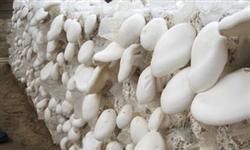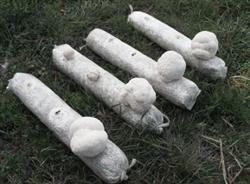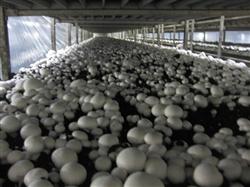Six taboos in mushroom planting

The main results are as follows: 1. The pre-wetting is insufficient: the straw should be fully soaked, and the straw that is not fully soaked needs a lot of water when turning the heap, and the hypha growth will be affected if the moisture cannot be replenished before the second turn. 2. Turn the pile unevenly: the pile should be turned according to the principle of "raw meal in the middle, clinker on both sides, two ends in the middle, and the middle in the middle", otherwise the purpose of turning the pile will not be achieved. 3. Soil collection is not up to the requirements: some growers use untreated vegetable garden soil when covering soil, and some add undermature cow dung. Such soil contains a large number of germs and eggs, which can easily cause a variety of diseases and insect pests and cause losses to mushroom growers. 4. Add urea when covering soil: new growers are used to equating mushroom planting with other crop planting. Adding urea when covering soil causes excessive ammonia smell and leads to mycelium death. 5. Spraying "closing water": spraying "closing water" at high temperature in the early stage of mushroom planting will cause high humidity environment, resulting in mycelium emergence, fungus formation and mushroom death, while spraying "closing water" in the later stage will easily lead to mycelium degradation and premature senescence. 6. Disease prevention is not timely: due to the lack of basic knowledge of identification and prevention of diseases and insect pests, some growers often begin to control diseases and insect pests when they are serious, so that they miss the best period of prevention and control, and the yield is seriously reduced.
- Prev

Cultivation techniques of hericium Erinaceus in Changshan
As early as the eighties of the last century, Changshan hericium Erinaceus was famous all over the country, and its output ranked first in the world. The fruiting body of hericium Erinaceus was cultured in bottles before the 1990s, and then cultivated in plastic bags after 1990s, that is, the culture materials were packed in plastic bags, sterilized, inoculated, cultured, and then grew into fruiting bodies under controlled cultivation conditions.
- Next

Mushroom growth "acne" what's going on?
Most of the mushrooms cultivated in China are white Agaricus bisporus, which are rich in protein, a variety of amino acids, vitamins and other nutrients, known as "human health food", domestic and export sales are very large. Therefore, vigorously developing mushroom production plays an important role in developing rural sideline and increasing income. One.
Related
- Fuxing push coffee new agricultural production and marketing class: lack of small-scale processing plants
- Jujube rice field leisure farm deep ploughing Yilan for five years to create a space for organic food and play
- Nongyu Farm-A trial of organic papaya for brave women with advanced technology
- Four points for attention in the prevention and control of diseases and insect pests of edible fungi
- How to add nutrient solution to Edible Fungi
- Is there any good way to control edible fungus mites?
- Open Inoculation Technology of Edible Fungi
- Is there any clever way to use fertilizer for edible fungus in winter?
- What agents are used to kill the pathogens of edible fungi in the mushroom shed?
- Rapid drying of Edible Fungi

